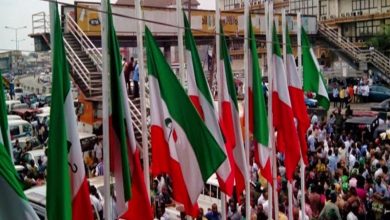
Fuel price in Nigeria today varies according to region. For example, fuel price per litre in Lagos today is different from fuel price in Abuja and Port Harcourt. NNPC fuel price in Nigeria is always lower than other fuel refilling stations in Nigeria. The pump price of fuel today is at the highest since the history of Nigeria. The price of fuel in Nigeria will only go down when the oil rich country stops importing fuel and start producing their own fuel by building good refineries with good working capacity. If you follow strictly the list of fuel price in Nigeria since 1960, you’ll understand how the price of fuel skyrocketed from 2015 to 2024……CONTINUE READING>>>>>>
List of Fuel Price in Nigeria since 1960
Fuel Price Increase in Nigeria
Fuel Price in Abuja Today
Fuel Price in Lagos Today
Fuel Price in Port Harcourt Today
NNPC Fuel Price in Nigeria Today
General Cost of Fuel in Nigeria Today
When the Price of Fuel will go Down in Nigeria
List of Fuel Price in Nigeria since 1960
In the 1960s, the price of fuel in Nigeria was 4 kobo NGN per litre. This was a period of significant economic growth and the fuel price was relatively low due to abundant oil reserves.
By the 1970s, the price had increased to 6 kobo NGN per litre, before the end of 1970s, fuel price increased to 15.3 kobo This was due to the oil boom, which led to an increase in the demand and price of fuel.
In the 1980s, the price of fuel rose to from 15.3 kobo to 60 kobo NGN per litre, this was mostly during Babangida’s reign as president. This was a period of economic downturn, which led to an increase in the price of commodities, including fuel.
Exposed!! Popular Abuja doctor revealed how men can naturally and permanently cure poor erection, quick ejaculation, small and shameful manhood without side effects. Even if you are hypertensive or diabetic . Stop the use of hard drugs for sex!! It kills!
By the 1990s, the price had increased from 60 kobo to 25 NGN per litre. This was due to the deregulation of the oil sector, which led to an increase in the price of fuel.
In the 2000s, the price of fuel rose to 65 NGN per litre. This was a period of economic growth, which led to an increase in the demand and price of fuel.
By the 2010s, the price had increased to 145 NGN per litre. This was due to the removal of fuel subsidy, which led to an increase in the price of fuel.
Today, the price of fuel in Nigeria is approximately 650 NGN per litre. This is due to various factors including inflation, exchange rate fluctuations, and changes in global oil prices.
Year Price of Fuel
1960s 2 – 9 kobo
1970’s 9 – 20 kobo
1982 20 kobo
1984 20 kobo
1984 20 kobo
1985 20 kobo
1986 39.5 kobo
1987 39.5 kobo
1988 39.5 kobo
1989 39.5 kobo
1990 60 kobo
1991 70 kobo
1992 ₦3.25
1993 ₦11.00
1994 ₦11.00
1995 ₦11.00
1996 ₦11.00
1997 ₦11.00
1998 ₦11.00
1999 ₦20.00
2000 ₦22.00
2001 ₦26.00
2002 ₦30.00
2003 ₦40.00
2004 ₦55.00
2005 ₦60.00
2006 ₦65.00
2007 ₦70.00
2008 ₦65.00
2009 ₦65.00
2010 ₦65.00
2011 ₦65.00
2012 ₦120
2013 ₦120
2014 ₦120
2015 ₦145
2016 ₦145
2017 ₦150
2018 ₦145
2019 ₦145
2020 ₦165
2021 168
2022 195
2023 626
2024 620 – 650
Fuel Price Increase in Nigeria
The current fuel price increase in Nigeria can be attributed to the deregulation of the petroleum industry. The Nigerian government, in an attempt to reduce its expenditure, removed fuel subsidies, leading to an immediate increase in fuel prices.
The cost of crude oil on the international market also plays a significant role in determining fuel prices in Nigeria. When global crude oil prices rise, the cost of refining and importing fuel into Nigeria also increases, leading to higher pump prices.
Also the fluctuation in foreign exchange rates contributed to fuel increase in Nigeria. Since Nigeria imports most of its fuel, a weaker Naira against the US dollar makes imported fuel more expensive.
Infrastructure challenges, such as inadequate refineries and poor transport networks, also contribute to the high cost of fuel. These inefficiencies lead to increased operational costs, which are passed on to consumers in the form of higher fuel prices.
The geopolitical situation can influence fuel prices. Unrest in oil-producing regions can disrupt supply chains, causing prices to spike. Similarly, changes in international trade policies or sanctions can also affect the cost of importing fuel.
Fuel Price in Abuja Today
As of today February 6, 2024, the price of fuel in Abuja, Nigeria, is approximately 635 to 700 Naira per litre. This price is subject to change by the Nigerian government.
The exchange rate of the Nigerian Naira against the US Dollar is another factor that influences the price of fuel. If the Naira depreciates against the Dollar, the cost of importing fuel (which is priced in Dollars) increases, leading to a rise in the domestic fuel price.
Fuel Price in Lagos Today
Lagos is one of the most populated cities in Nigeria. It’s infact the trade hub of the nation. The price of fuel in Lagos is diferent from that of Abuja. Fuel price in Lagos is lower than that of Abuja. As of today, the fuel price in Lagos, Nigeria, is approximately 640 Naira per litre. Remember that this price varies a little from filling station to filling station.
Fuel Price in Port Harcourt Today
The fuel price in Port Harcourt, like in many other parts of Nigeria, is subject to fluctuations due to various factors. These factors include global oil prices, exchange rates, and local demand and supply conditions.
Currently, the price of fuel in Port Harcourt ranges between 650 and 700 Naira per litre. However, please note that this price can vary slightly from one fuel station to another, depending on their operational costs and profit margins.
NNPC Fuel Price in Nigeria Today
Fuel Price in Nigeria
The Nigerian National Petroleum Corporation (NNPC) is the state oil corporation responsible for the exploration and production of petroleum and petroleum products in Nigeria. It plays an important role in determining the price of fuel per litre in the country. NNPC has different pump price for different regions in Nigeria.
The NNPC, in collaboration with the government, sets the official fuel price. As of the time of writing, and today being February 6, 2024 the official pump price of petrol (PMS) is around 488 to 545 Naira per litre. However, this price is subject to change due to various factors such as changes in global crude oil prices, exchange rate fluctuations, and local demand and supply conditions.
The exchange rate of the Naira can affect fuel prices. If the Naira depreciates against the US dollar, the cost of importing fuel can increase, leading to higher prices at the pump. Therefore, economic stability and strong foreign exchange reserves are important for maintaining affordable fuel prices.
States NNPC Petrol Pump Price (₦)
Lagos ₦488
Ogun, Oyo, Osun, Ondo & Ekiti ₦500
Kwara, Abia, Imo, Akwa Ibom & Bayelsa ₦515
Rivers, Cross River, Edo & Delta ₦511
Ebonyi, Anambra & Enugu ₦520
Abuja, Plateau, Nasarawa, Kogi, Benue & Niger ₦537
Sokoto, Katsina, Kaduna, Kano, Jigawa & Zamfara ₦540
Kebbi ₦545
Adamawa, Bauchi, Taraba & Gombe ₦550
Borno & Yobe ₦557
RECOMMENDED FOR YOU; Price of Refilling Cooking Gas Per Kg in Nigeria Today
General Cost of Fuel in Nigeria Today
Fuel pricing in Nigeria is a contentious issue due to the country’s heavy reliance on imported petroleum products. Despite being one of the world’s largest oil producers, Nigeria lacks the refining capacity to meet its domestic fuel needs. Thus, it imports most of its refined petroleum, and the cost of these imports significantly affects the local fuel price.
In 2023, the government announced the removal of the fuel subsidy, aiming to allow market forces to determine fuel prices. This move has led to fluctuations in fuel prices, with the NNPC adjusting prices in response to changes in global oil prices and other market dynamics.
However, the implementation of this policy has been inconsistent, leading to uncertainty and occasional fuel scarcity. The NNPC and the government continue to play a significant role in setting fuel prices, leading to calls for more transparency and efficiency in the process.
As at today February 6, 2024 the average price of fuel in southern Nigeria is 635 naira per litre while the average price of fuel in the middle belt is 655 naira per litre, the northern Nigeria pays an average of 680 naira per litre.
When the Price of Fuel will go Down in Nigeria
Predicting the exact timing of a decrease in fuel prices in Nigeria is challenging due to the numerous factors that influence these prices. However, understanding these factors can provide some insight into potential trends.
Another key thing to consider is the exchange rate of the Nigerian Naira. If the Naira appreciates against the US dollar, the cost of importing fuel (which is priced in dollars) decreases, potentially leading to lower fuel prices.
In conclusion, while it’s difficult to predict exactly when fuel prices will decrease in Nigeria, understanding what led to the increase can provide a sense of potential trends. Monitoring them and staying informed about global and local economic conditions can help anticipate changes in fuel prices.……CONTINUE READING>>>>>>




